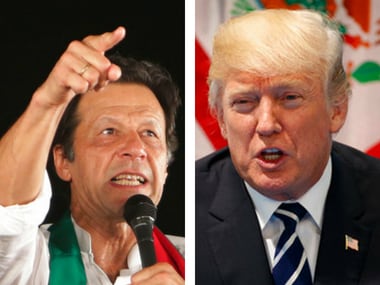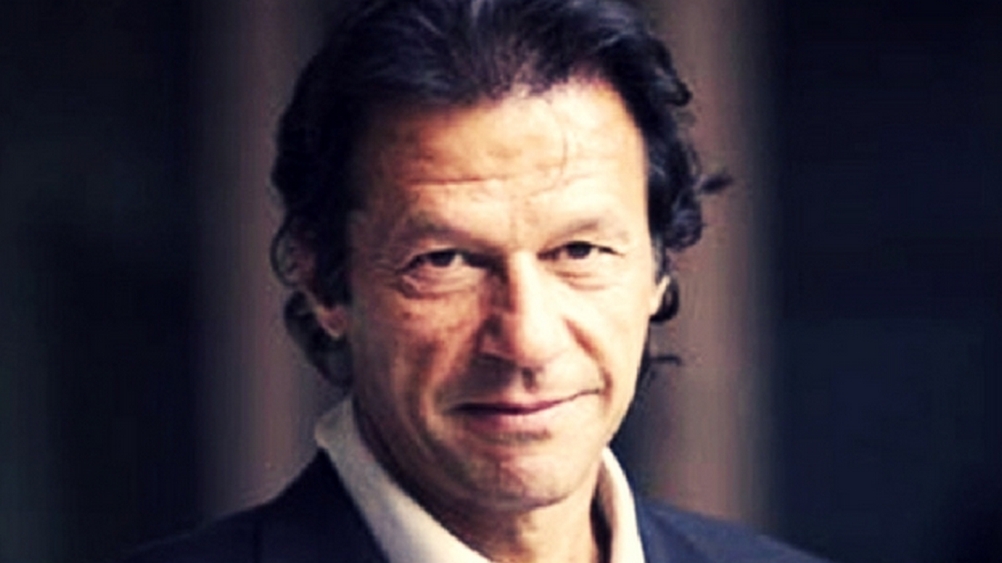Pakistan Election Results 2018: Despite anti-US poll rhetoric, ties likely to be stable under Imran Khan
Now that the military has succeeded in its mission of installing Imran Khan as the new prime minister of Pakistan (a euphemism of sorts for a glorified mayor), the world must engage with the politician who has finally been allowed to sit on the chair that he has been eyeing for the last two decades.
An Oxford-educated legendary cricketer who ruled the cricket pitches and London nightclubs with equal ease, Imran, in his avatar as a politician, has been at pains to shed his flamboyant image in favour of a sharp turn towards Islamism. He has shunned the western attire for a pristine white salwar kameez, carries along large praying beads and has put his past marriages to a high-profile British heiress and a British-Pakistani TV anchor behind, to get wedded to a ‘faith healer’ who prefers to stay behind the purdah.

File image of Imran Khan and Donald Trump. AP
Mercurial and enigmatic in equal parts, Imran has little administrative experience and even less appetite for policy positions. His own advisors and closest aides admit that he is not a “strategy guy” and has never gone beyond the skin on policies. Vice-president of Pakistan Tehreek-e-Insaaf (PTI) Asad Umar, tipped to be the finance minister in new cabinet, in an interview to The Times, UK, conceded that his boss ” has never been in an institution, and doesn’t know how to work in an institutional setting.”
What could be the impact of such a rookie administrator in managing Pakistan’s relationship with the US which has fallen into a state of dangerous disrepair?
As a candidate seeking to find a route to power, Imran has cashed in on the reflexive anti-Americanism that permeates the polity of Pakistan. He has bristled at US president Donald Trump’s accusations that Pakistan provides a safe heaven for terrorists. Trump has blamed Pakistan for undermining the “war on terror” by giving shelter to Afghan Taliban and Haqqani Network terrorists who ambush US and peacekeeping forces in Afghanistan and escape into the tribal regions of Pakistan to avoid retaliation.
Trump has responded by blocking military aid to Pakistan and cutting all other forms of aid to a trickle. He has also used an extensive drone campaign to ferret out the terrorists from their tribal hideouts in Pakistan’s northwestern regions. Imran has led demonstrations against US drone strikes and has called it “inhumane” and violative of human rights. He has also accused the Us of exploiting Pakistan and blamed own leaders for letting the country be used as a cat’s paw in America’s war on terror.
In respond to Trump’s tweet that Pakistan has taken billions and billions of dollars from the US in return for “lies” and “deceit”, a fiery Imran had called for immediately removing “excessive US diplomatic, non-diplomatic and intelligence personnel from Pakistan” and denying the US ground and air route support to troops in Afghanistan which Pakistan, he claimed, was providing “free of cost”. He also blamed the US for crippling Pakistan by leaving its society polarised, causing “70,000 deaths and $100 billion in losses to the economy”.
A large part of this criticism could be put down to poll rhetoric. Imran had a compulsion to portray himself as a leader who will set the ourse for a “more equal” relationship with Washington rather than letting Islamabad be treated as a “doormat”. This position is perhaps a necessary ingredient of poll success in a country where 59 percent of people describe the United States as an “enemy”.
But, as Mehreen Zahara Malik writes in Foreign Policy, “Once Khan is finally and safely in power after prowling the margins of Pakistani politics for almost two decades, he may no longer need to surf Pakistan’s permanent wave of popular anti-American sentiment with such dedication. Once the work of statecraft begins, the rhetoric will self-calibrate.”
A little bit of that reality might have already set in when it became clear to Imran that it might be his turn at prime ministership. In January last year, Imran was breathing fire against the Trump administration’s decision to ban citizens from certain Muslim nations from visiting the US.
In his words, “I want to tell all Pakistanis today,I pray that Trump bans Pakistani Visas so that we can focus on fixing our country,” he said at a public rally. He also promised not to “beg” before the IMF for funds. “We will have to fix Pakistan and stand on our own two feet. And the day that we decide this is our home and we have to fix it, we won’t beg for loans from the US and the IMF.”
A year later in May, during a visit to the UK when he held a private meeting with an equity investment company, Imran reportedly admitted that Pakistan might have to approah the IMF for financial assistance.
This wasn’t just opportunistic re-positioning from Imran, but a pragmatic acceptance of a fact that Pakistan economy is in doldrums and it needs every bit of help that it can muster. It tells one that Imran is not immune to the sobering effect of power, and people were witness to more such recalibration from the PTI chief soon after he gave his victory speech.
In his maiden televised address to the nation, Imran made all the right noises on China, Afghanistan and even India, and called for mutually beneficial ties with the US. He stressed on a relationship that is “equal” in nature and not of a rent-seeking kind where Washington will force Pakistan to fight its war in exchange for money.
“With the US, we want to have a mutually beneficial relationship… up until now, that has been one way, the US thinks it gives us aid to fight their war… we want both countries to benefit, we want a balanced relationship,” said Imran.
At the risk of sounding repetitive, let it be clear that for all of Imran’s protestations and solemn declaration on foreign policy, he simply has no power in altering the country’s trajectory. The strings of Pakistan’s foreign and security policy are firmly in the hands of the military (also known as the establishment) and it will not allow any civilian leader to alter the course or establish the primacy of an elected government over unelected generals. Imran would have carefully noted the fate that befell Nawaz Sharif who paid a heavy price for his misadventure.
If the fundamentals of a relationship are not going to change under any civilian leader, how much importance should we give to Imran’s words? There are two things to consider. One, the trajectory of US-Pakistan relationship, seen as widely divergent in recent times, might see some sort of an alignment over Afghanistan.
Imran has long advocated a political solution for the war in Afghanistan and wants the Taliban and Afghanistan leadership to sit across the table. “The only way Pakistan can now help the Americans is to use the influence it has on the Taliban to get them across a table so that there is a political solution to this issue,” he has been quoted, as saying by Financial Times.
Recent indications are that Trump, who likes to “win”, is fed up with an unwinnable war in Afghanistan and has dispatched top envoys for South Asia to “talk directly” with the Taliban leadership in Doha to build on the ceasefire. Wall Street Journal says “ Ambassador Alice Wells , the State Department’s deputy assistant secretary for South and Central Asia, led the US delegation, which met with members of the Taliban’s political commission in Doha” to explore “all avenues to advance a peace process in close consultation with the Afghan government”.
There could some rapprochement here. Second, a civilian leadership that has less of a tension with the military (a position that the PTI government will enjoy) may find it easier to settle on policies without pulling in different directions. For all its fire and fury, Pakistan’s civilian leadership or the military cannot afford to antagonise the US beyond a point, and hedging strategies with China come bundled with own problems.
It is safe to assume that under Imran (handheld by the military), there might be a little more stability in US-Pakistan ties after a period of extreme turbulence.




